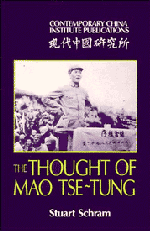Crossref Citations
This Book has been
cited by the following publications. This list is generated based on data provided by Crossref.
Howard, M. C.
and
King, J. E.
1992.
A History of Marxian Economics.
p.
167.
DENTON, KIRK A.
1993.
1989 DEMOCRATIC MOVEMENT AND THE MAY FOURTH.
Journal of Chinese Philosophy,
Vol. 20,
Issue. 4,
p.
387.
Ma, Stephen K.
1993.
A dangerous game: Deng and the intellectuals.
Journal of Contemporary China,
Vol. 2,
Issue. 2,
p.
53.
Schram, Stuart R.
1994.
Mao Zedong a Hundred Years on: The Legacy of a Ruler.
The China Quarterly,
Vol. 137,
Issue. ,
p.
125.
Chan, Alfred L.
1995.
Leaders, coalition politics, and policy‐formulation in China: The great leap forward revisited.
Journal of Contemporary China,
Vol. 4,
Issue. 8,
p.
57.
Phillips, Richard T.
1996.
China since 1911.
p.
84.
Phillips, Richard T.
1996.
China since 1911.
p.
11.
Phillips, Richard T.
1996.
China since 1911.
p.
161.
Phillips, Richard T.
1996.
China since 1911.
p.
187.
Phillips, Richard T.
1996.
China since 1911.
p.
117.
Phillips, Richard T.
1996.
China since 1911.
p.
40.
Wong, Kam C.
1998.
A Reflection On Police Abuse of Power in the People's Republic of China.
Police Quarterly,
Vol. 1,
Issue. 2,
p.
87.
Mohanty, Deba R.
1998.
Hidden players in policy processes: Examining China's national security research bureaucracy.
Strategic Analysis,
Vol. 22,
Issue. 4,
p.
587.
Zhu, Lisheng
2000.
The Problem of the Intelligentsia and Radicalism in Higher Education Under Stalin and Mao.
Europe-Asia Studies,
Vol. 52,
Issue. 8,
p.
1489.
Shapiro, Judith
2001.
Mao's War Against Nature: Legacy and Lessons.
Journal of East Asian Studies,
Vol. 1,
Issue. 2,
p.
93.
Knight, Nick
2002.
The role of philosopher to the Chinese communist movement: Ai Siqi, Mao Zedong and Marxist philosophy in China.
Asian Studies Review,
Vol. 26,
Issue. 4,
p.
419.
Manicas, Peter T.
2003.
Mao and Utopianism.
The Journal of Comparative Asian Development,
Vol. 2,
Issue. 2,
p.
259.
Scobell, Andrew
2003.
China's Use of Military Force.
McDougall, Bonnie S.
2004.
Privacy in Modern China.
History Compass,
Vol. 2,
Issue. 1,
U, Eddy
2005.
State Management of Careers, Workplace Conflict, and Regime Legitimacy in Socialist China.
The Sociological Quarterly,
Vol. 46,
Issue. 2,
p.
359.





